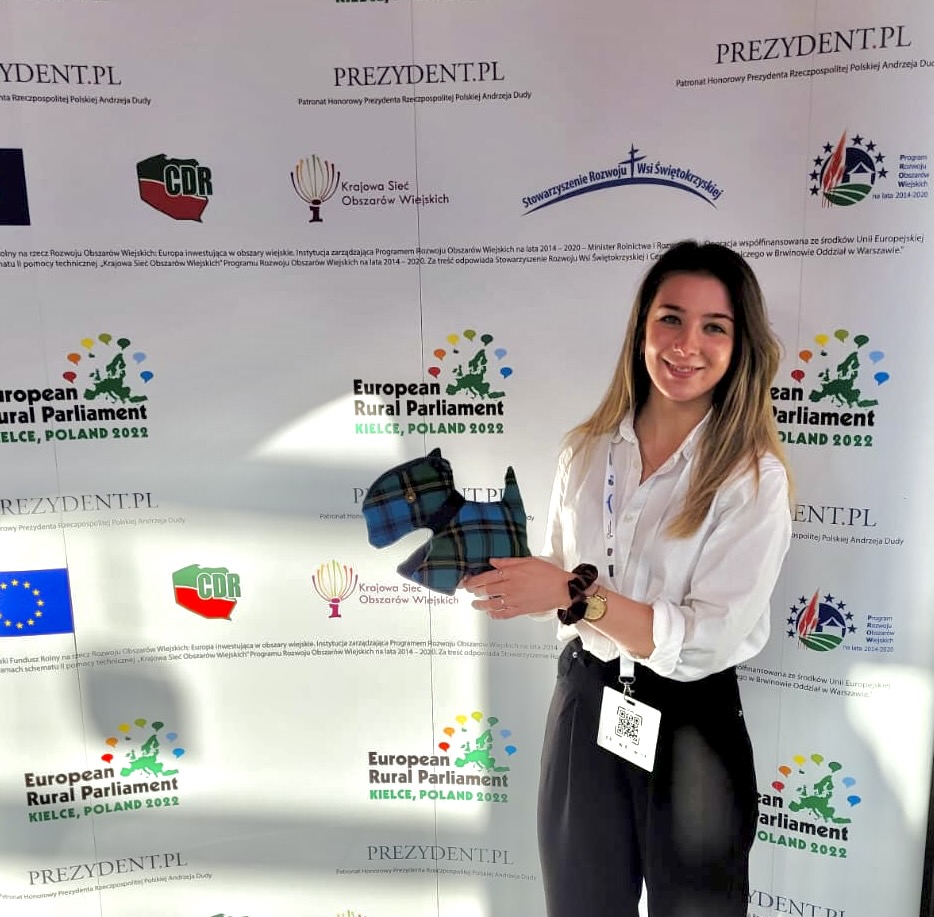
In this blog, our Communications Assistant, Kirsten, tells us about her experience when she attended the European Rural Parliament in Poland last month.
In September, I was delighted to have the opportunity to join the Scottish delegation attending the 5th European Rural Parliament (ERP) in Kielce, Poland – a gathering of 400 rural people, including researchers, representatives from rural organisations, national governments and European institutions, from 39 countries across Europe. The ERP is a long-term campaign to amplify the voice of rural people. It is recognised by the European Commission and plays a significant role in shaping European rural policy, through the belief that rural people themselves have the best understanding of their strengths, potential and needs. The main gathering of European Rural Parliament (ERP) takes place in a different location every two years. It results in a Declaration, backed by a more detailed manifesto.
Delegates came from diverse range of backgrounds, including Ukraine and Armenia, which are both facing extraordinary challenges, bringing experience, expertise and perspective on variety of common rural issues. We spent four, very full, days hearing from passionate individuals and organisations, comparing our issues, sharing our stories, listening and learning.

As a 25 year old, who has returned to the rural peninsula of Applecross on the west coast, to live and work, I’m used to comments from people who struggle to understand my choice to be here, often feeling its their place to enlighten me on what I’m ‘missing out on’.
“There’s nothing to do here! Don’t you get bored?”
“Why don’t you move to a city, there’s nothing here for young people.”
“I could never live here…”
Whilst this unsolicited life advice doesn’t really bother me, it does perpetuate the stigma that young people in this area still face when they choose to stay, return or move here for the first time. I don’t feel like this stigma is talked about a lot, but most of my peers will confirm it is prevalent. Something I loved most about the ERP, was being surrounded by hundreds of people, from every corner of Europe, who understood why we choose to live in, work in and advocate for rural areas. No stigma, explanation nor justification needed.
Throughout the week, I participated in workshops on rural proofing and youth employment, as well as a genuinely inspiring ‘ideas café’, led by youth delegates attending through Erasmus. The discussions I had highlighted the individuality of every rural place and paradoxically, our shared struggles.
Seven of us, all of different nationalities between the ages of 20 and 30, sat around a table to discuss housing. Empty or unaffordable houses were a common theme, but not always for the same reasons. In that half hour, we dissected the issue from our different perspectives before painting our shared vision for our rural future, sharing practical ideas and suggestions on how we might get there. The crux of our review was simply that rural areas need adequate, affordable housing options – a basic human right which has become somewhat a luxury in the UK, that both rural and urban dwelling young people are frequently denied.
From constructive conversations on housing to agriculture, and climate change to employment, we tackled a wide range of issues head-on. During these conversations and presentations, I found myself considering this aforementioned idea of stigma. There we were, 400 of us, fans of rural for a variety of reasons, sharing our understanding of the global importance of rural areas for society as a whole, as a producer of food, with outstanding natural capital, and opportunities for the green future we urgently need to pursue. But, to achieve our great potential, we need urban people to understand too. We need to fundamentally change the urban lens that views rural areas as vast expanses of nothingness, starting in our education systems. Rural areas have so much to offer and as the youth delegates concluded, they cannot be ignored.
At the end of the week, we witnessed the signing of the Rural People’s Declaration of Kielce, a moment which felt very empowering. Part of me had been concerned that I would leave the ERP feeling fatigued and disillusioned after delving too deep into the issues in which I have a personal, professional and emotional stake, but I was surprised to truly feel the opposite. I ended the week with a revived sense of purpose and optimism, which is hard to come by just now, for rural futures. There’s a lot of work to do, but a problem shared internationally, is certainly a problem that feels a lot lighter.
